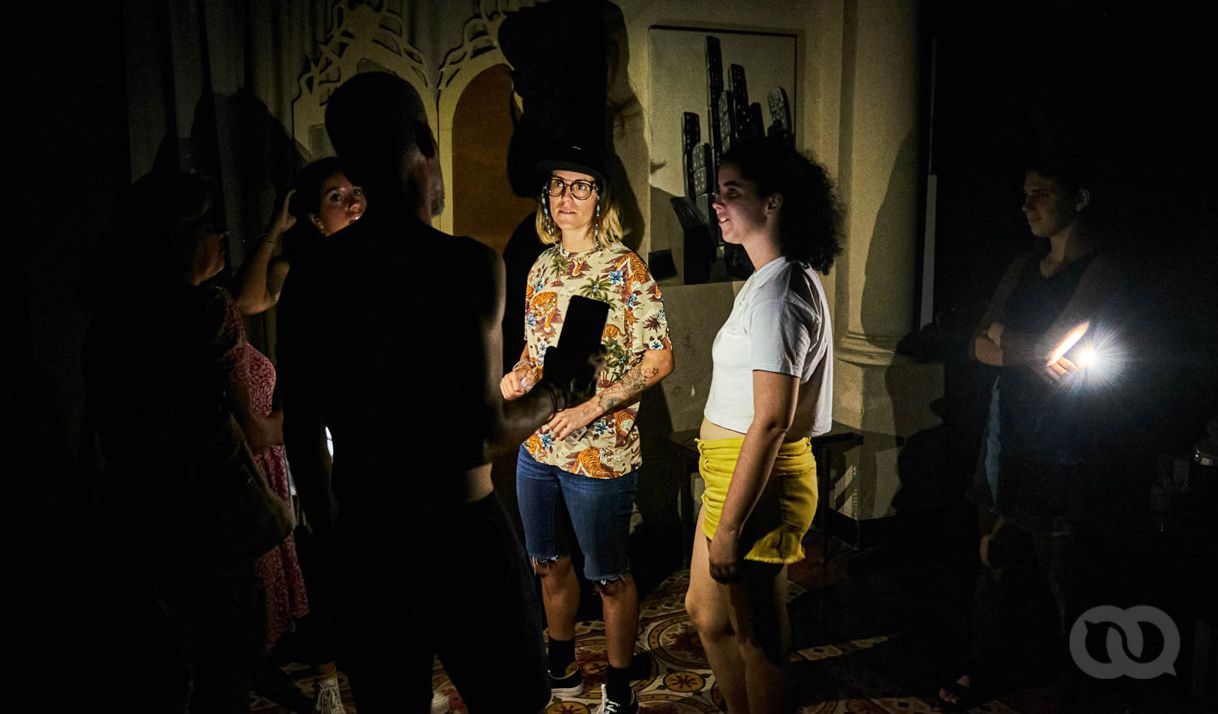
Blackouts also affect the private sector. Photo: David López.
Blackouts in Cuba: A Menace to the Private Sector
7 / julio / 2022
The fan turns on and Martha gets out of bed. Her eyes close as she tries to switch on the computer. She’d fallen asleep just an hour earlier. It’s hard to rest during a blackout: the heat is unbearable.
Martha is a self-employed worker at a photo studio in Las Tunas. She not only takes photos, but then she also edits them at home. Every session needs to be ready in no more than a week.
“Ever since “scheduled blackouts” started, my work hours – and life – has been a disaster. Now, we must take the photos we’d take in a day, over two,” she says.
She plans photo sessions at the studio and outside locations, depending on the blackout schedule. However, sometimes the Electric Company (UNE) doesn’t keep to its schedule and she has to improvise when customers come in and there isn’t any electricity.
“Sometimes, we can go ahead with the photos in outdoor locations, but sometimes we can’t. It all depends on transport, sunlight, the weather, etc.”
Martha says that she used to work in the mornings when she didn’t have a session scheduled, and at night if she had something left over to do. Now, her working hours “depend on the UNE: whenever the electricity comes on, I work, it doesn’t matter if its midnight or the early morning. Whenever, not only because of the commitment to my customers, but also because taxes are the same. They cut the electricity and make our work hard, but they are still strict with ONAT payments.”
Shutting down private production
The residential sector in Cuba consumes 60% of electricity generation. A lot of the time, business owners run their businesses from their own homes, or at rental spaces rented out by the State. The irregular electricity supply also affects them.
Behique is an artisan jewelry brand that has grown beyond its native city of Cienfuegos and is now reaching different areas in Cuba and the rest of the world. With a selection of gems, mainly set in silver, it has a workshop to create and mold its pieces.
According to Diana Ortega, the owner, blackouts have affected every aspect of family-run businesses and even dynamics at home. “Creating in such unfavorable conditions has become our Sisyphus boulder,” she laments.
“Blackouts have affected pretty much all our processes, from the creative seed to sales management because the terrible (electricity) planning is whimsical and unpredictable. We’ve closed the workshop for days. We couldn’t even make something special for Father’s Day, like we have in previous years,” she explains.
Against this backdrop of irregularity and uncertainty, businesses haven’t been able to come up with a strategy to optimize working hours at the studio. It’s even harder for Diana with a little girl around the house.
“You can’t come up with a plan when you have a 5-year-old who also needs strategies and time. After spending never-ending nights with fans and happy stories, you must deal with the next day, with all of the exhaustion and despair, with customers who carry the same burden as you, a lot of the time. This is why management is also affected.”
The old Ice Factory in Las Tunas – which had shut down for over two years – was rented out to Hielo Caribe SLR, making headlines just over two months ago. The private business made headlines for its ice and ice-cream stick production, with different flavors.
In an interview with ACN news, its founder, Humberto Baldoquin Labrada, said that one of his main objectives is to increase sales and diversify production. However, weeks later, production was in jeopardy because of scheduled blackouts lasting over 8 hours every day, and high temperatures.
Even though Humberto says that it’s hard to work without electricity, he says that they took the initiative to adapt production and adjust working hours according to blackouts published by the Electricity Union in Las Tunas.
Hielo Caribe SLR, just a month old, can’t afford to stop production now and asked provincial authorities to move their retail points to places with electricity.
It’s true that these transfers are uncomfortable and even mean spending resources, but Humberto prefers to see this as an alternative rather than halting production. “Wherever there’s electricity, that’s where we’ll be,” he says.
Not only economic consequences
According to Sara Rodriguez, blackouts have been a return to the past. Not only living in darkness at any time of day, but also because her beauty salon in Sancti Spiritus has been directly affected as she isn’t able to offer services using electricity.
This is the case of a tattoo studio, which had to stop working in the middle of a non-scheduled blackout. The tattoo artist has found a solution with a wireless machine, and he works out in the backyard, for light.
Another service that has nearly grinded to a halt is facial treaments, as most of them rely on electrical machines. A few minutes without electricity, and the wax heater for depilation purposes stops working and customers also need it.
Sara, who is a hairdresser, has continued with hair cuts and color, but has stopped giving keratine treatments regularly – one of the most highly-sought-after services – because it requires a hairdryer and straightener, both of which use electricity.
Customers are becoming more and more uneasy amidst this landscape, as they not only lose access to many services, but those who are able to receive them don’t get the quality and comfortable service a salon normally offers, with air-conditioning and the final touches.
“You have customers sitting for two hours, with their heads full of foil, with the robe on, and heat. They sweat, there isn’t enough air… Luckily, none of them have fainted yet. Sometimes, they must leave with wet hair like back in the ‘80s, when you didn’t dry or style their hair,” Sara says.
For businesses that depend on electricity and the Internet, this new season of blackouts has been stifling in more than one sense.
Carla runs a digital communications agency from Santiago de Cuba. Her services are directly linked to content management on social media for Cuban and foreign businesses, which she needs electricity for to be able to access her work devices.
Although she’s learned she needs to leave all her devices charged up from the night before, when blackouts are six or eight hours long, the devices run out of charge and cut her working day. “There are days I can only work two hours,” she explains.
“This happens to all of us here at the agency. For example, the designer who works on a desktop, has to adjust to when there is electricity, which is mostly at night.”
The days when blackouts are more intense and regular, the grid where Carla lives (and works), suffers blackouts from the morning. This situation reduces her ability to be 100% efficient.
“There’s consequences hardly anyone is talking about, but it’s the most serious for me: psychological harm.” When day breaks without electricity, my drive and mood change. I start feeling bad, I sweat, have headaches and I’m a lot less productive. This also influences team management, and my employees must put up with my bad mood,” she says.
Blackouts in the morning also leave a mark on her relationship with clients, as this is also when she coordinates work meetings with them.
“I’ve had to cancel meetings with clients for this reason. Lots of them are understanding and we set a new date, but others are unable to change their schedules around the electricity company, because they have so much work to do.”
This article was translated into English from the original in Spanish.


If you believe that our journalism is important for Cuba and its people, we want you to know that this is a critical moment.
Behind each publication there is a team that strives to ensure that our products meet high quality standards and adhere to professional and ethical values.
However, to keep a close watch over government, demand transparency, investigate, analyze the problems of our society and make visible the hidden issues on the public agenda is an effort that requires resources.
You can contribute to our mission and that is why today we ask for your help. Select the way you prefer to send us a donation.








comments
We moderate comments on this site. If you want to know more details, read our Privacy Policy
Your email address will not be published. Mandatory fields are marked with *